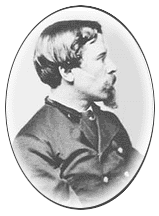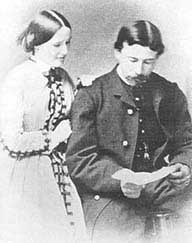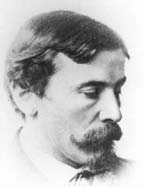Part III: Life in the Business World and among Friends Early Business Ventures: An Education of a Different Kind During
the final year of the Civil War, Henry had at last found
an opportunity for employment. From January through July
of 1865, he worked as an agent for the Buckeye Oil
Company in Ohio, purchasing equipment and contracting
laborers to work in the oil fields. Living out of a
"shanty" boardinghouse was a "comfortless,
dirty and lonely" existence for Henry, though less
dreary after his wife Ida joined him during the latter
part of his stay there. However, the wells did not
produce the quantity of oil that the owners and investors
had anticipated. As a result, the company foundered and
the Higginsons returned home to Boston.
We asked and asked about
plantations and about means of getting at them, and at
last heard of one called "Cottonham," belonging
to an old man named Rogers. After trying for a week to
get means of communication, we at last lighted on one
venturesome hack-driver who would take us, for there were
only two hacks in the town, and no means of conveyance
except a dray [cart]. The railroad was gone, and the
plantation was fifteen miles from the railroad. So we
started out, came to various broken bridges, got across
somehow or other, crossed the Ogeechee in a ferry and
reached a point on the railroad. From there it was a
clean drive in the sand to the plantation, fifteen miles,
with not a soul in sight and not an animal except one
deer. We came to a bridge some twenty feet wide, and
tried it to see if it was good. It seemed sound, and we
drove on to it. The horses went through with all eight
legs and hung there by their bellies. The driver was
frantic, and said we had ruined him. We unhitched the
team, and worked hard to get the horses' legs out on to
something stable, putting in fence-rails for that
purpose. At last we got them up, pulled the carriage over
and drove to the plantation. On November 15, 1865, a month after purchasing Cottonham, Higginson wrote to his father about his great expectations for the success of this experiment: We [Clapp, Morse, and I] mean to cultivate 400 acres of cotton. A good yield is 120 lbs. to the acre on that plantation.... I have here calculated everything to come in low, and every expenditure high. Next year we can probably cultivate much more land, and we shall average, one year with another, much more cotton to the acre. I have left out all gain of stock, such as cattle and hogs, which cost literally nothing and are very productive. With business at the plantation running smoothly, Henry returned home to Boston for Christmas. After the holidays he brought Ida with him to Cottonham, and together they put their heart and soul into work with the laborers, educating them and preparing them for life outside the plantation. But their hard efforts and good intentions were not enough to overcome the differences between the two cultures and lifestyles. Concepts such as receiving wages for labor and dealing with cash to purchase goods were difficult for these former slaves to understand, as they never had ownership of anything in this country. How could Henry and Ida convince these workers—who had only known oppression in the hands of white men—that they had their best interests at heart? In August, Henry brought Ida home to Boston and returned to Cottonham. This time, he encountered new struggles in addition to those that involved his workers. The weather turned foul, and the once-flourishing crops began to perish. In letters to his father written during autumn that year, Henry candidly reported: The continual rains are injuring our crop considerably. Yesterday we had two tremendous showers lasting several hours altogether, and to-day we found quite a lot of cotton beaten out and lying dirty and useless in the sand.... It [the rain] has [arrived a season too late and has] cut off all our profit, I fancy.... We have made about half a crop; and seem likely to get a low price for our best cotton.... So we have lost a good deal of money. But in his communications to Ida, Henry tried to assuage her fears about their finances: Please remember that one great reason for our coming here [to Cottonham] was the work of great importance to be done for these blacks. Money is less valuable than time and thought and labor, which you have given and will give freely.... Ida returned to Cottonham for Christmas to join Henry who was beginning to have doubts about continuing this venture. In January 1867, Henry confessed in his next letter to his father: I should have done better to enter your office [—the stock brokerage house of Lee, Higginson and Co.—] in '64 as a paid clerk with a prospect of becoming partner: indeed should do so now, if that were possible. Still this work, embracing as it does the whole black question, is highly useful and important. If I were rich enough to disregard gains, and could spend something on the welfare of the blacks, Ida and I could doubtless produce some satisfactory results in a few years. A little money put into better houses and into the simplest home-comforts would tell greatly. Henry's woes with Cottonham increased as the year progressed. The house servants and some laborers were caught stealing from them. What's more, they discovered that Mr. Rogers had really owned only 2500 of the 5000 acres he had sold them. Though frustrated by the project in general, Higginson remained patient and compassionate towards his workers. In April, Henry wrote to his father: The blacks will advance, if they are led, and if they will trust anyone. Now they cannot be induced to talk, to ask questions. They will listen, but not heed much from a white man. By late spring, however, Cottonham's failure seemed inevitable. Channing Clapp headed home after a wave of heat arrived along with an infestation of rats, mice, fleas, and malaria. When Ida developed a touch of malaria, Henry decided it was time to give up the project entirely, despite the fact that Ida believed they could make a difference if they stayed another year. The Higginsons left on May 21, 1867, with Charles Morse now the sole overseer of the plantation. Morse held out hope for the crops that began to revive during summer, but by September when they were consumed by caterpillars, he too realized that all hopes for Cottonham were in vain. Building a Future with His Family
The start of the next decade found the
Higginsons celebrating the birth of their daughter
Cécile on January 5, 1870. That summer, the family left
their residence at Hotel Hamilton and stayed in a rented
cottage at Beverly Farms, near the coast. Henry did not
spend too much time away from work, however, as his new
career kept him well occupied, often traveling to sites
of prospective investment opportunities. In this decade,
he also began to expend efforts to honor those dearest to
him in some tangible form that could benefit a number of
people. The first of these projects was the construction
of the Hotel Agassiz, a French flat (apartment house)
that he named for Ida. Built in 1872, this edifice still
stands at 191 Commonwealth Avenue, its living spaces
converted to condominiums in recent times. ...I'm pleased very much to be so kindly and affectionately received by all and to find that I've not been forgotten during this eighth of a century—egotistical, is n't it? but very pleasant for one who prizes friends. Then too I 'm greatly pleased to see how sundry men, whom I knew, have grown larger and better. One of them is director of the opera, another is sub-director, another leader of the orchestra, etc., and the chief of the Conservatorium, which is greatly improved.... A month later, Henry's letter to his father expressed his pensive side. As in days past when he first contemplated a career in the firm, he was filled with self-doubt regarding the non-fulfillment of his personal goals and his work in the world. However, as he now approached his 39th birthday, his view of his father had broadened and matured over time. Having come to know George Higginson as a business partner, Henry could now better appreciate his father's personal character and accomplishments. My real regret down-town, beyond my own ability to regulate my life well and to do much without so much worry to me, is, that I don't gain wisdom much. To lose money is no such serious matter, but to see clearly that one will lose and to act accordingly in due season to avoid it—that is worth working for; and when shall I get it? Another thing came to me clearly one day in London: "We can't serve God and Mammon," which always had a distinct enough meaning for me, but—if one wishes a thing very much indeed and works and struggles for it, one is likely to lose balance a little and may sacrifice better things. You have preserved your honesty entirely thro' a long and hard life, and it is a wonder. Well, perhaps one reason has been that you 've cared more to keep your balance and your honesty than to get money.... Henry also reflected fondly on his mother: To-day [August 16 (mother's birthday)] is to be remembered always—and has been here. Sixty-two years old—and 24 years since she died. It is a great while, and has been a great deal longer for you than for us, and I am older than mother was. You have had a hard life—certainly not without its joys too, but still a hard and dry life, which is all the more reason for my being at home soon. How well I remember the last summer of mother's life! When
Higginson returned to Boston in September, panic hit the
financial world as cash became scarce due to
over-trading, over-construction in America, and excessive
borrowing overseas. Businesses shut down over night and
many laborers lost their jobs. Though it would take years
for the economy to recover, Lee, Higginson and Co.
survived in its industry. The Beginnings of a Musical Legacy Henry
Higginson was not one to quit in the face of adversity.
During the course of his life, challenges were not
obstacles but opportunities for learning, personal
growth, and higher achievement. Though he was dealt his
share of suffering, Henry continued with his noble ideals
for the betterment of the lives of his friends—even
those whom he would never meet—and his gifts to
humanity were enduring. Sixty
years ago I wished to be a musician, and therefore went
to Vienna, where I studied two years and a half
diligently, learned of music, something about musicians,
and one other thing—that I had no talent for music.
I heard there and in other European cities the best
orchestras, and much wished that our own country should
have such fine orchestras. Coming home at the end of
1860, I found our country in trouble, and presently in a
great war. Naturally I took part in the war, [and
thereafter pursued a few opportunities before becoming a
partner at the firm of Lee, Higginson, and Co.]. But it was more than a boyhood desire and a love of music that motivated Higginson to establish the Boston Symphony Orchestra. In a letter to Miss Frances R. Morse on September 18, 1881, he credited the sources of his inspiration for undertaking this monumental achievement: I had a noble set of men-friends and loved them much and lived on them. They led me in part to thoughts and hopes which have resulted in this scheme. It seems to me to be worth while, and to be a little gravestone to them if anything, for they are all dead but one—a great loss to me and the world. To these friends I tried to give everything, because my belief was that one cannot do or give or take too much from a friend.
Part III of Henry's story continues: Page 1 | Page 2 | Page 3 | Page 4
Index to Higginson's Pages
Copyright © 2001 - 2009 1st Dragoon's Civil War Site. All rights reserved. |
||||||||||||



